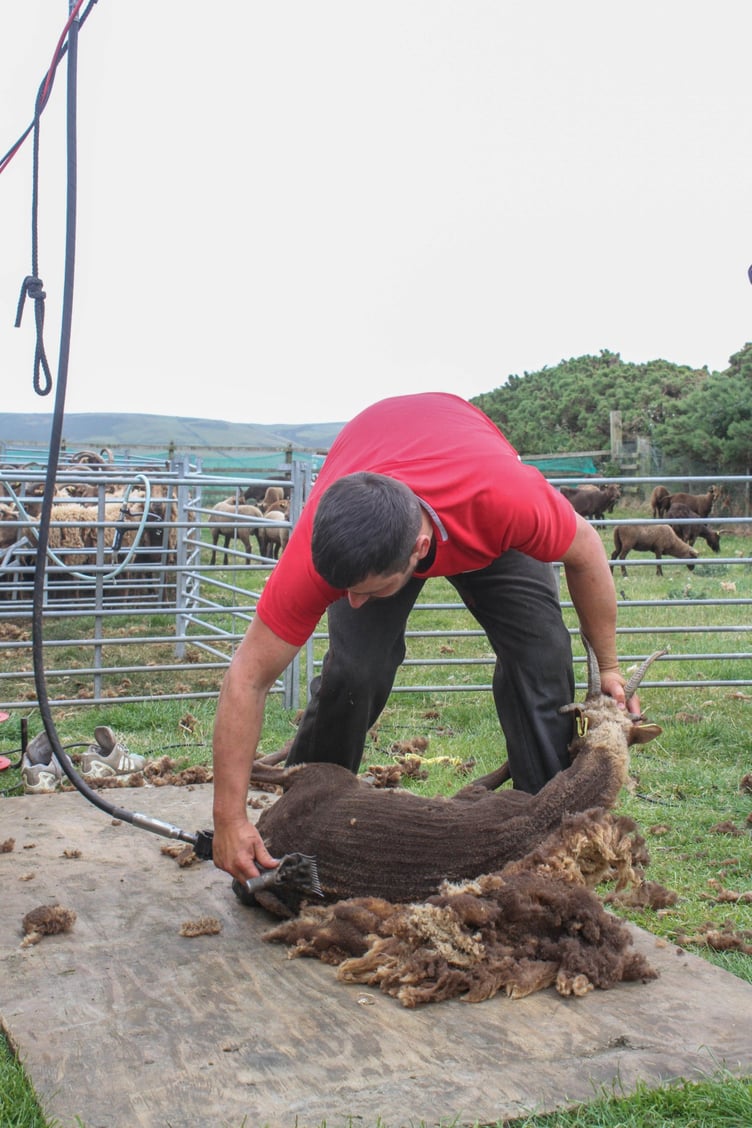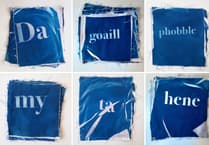It’s shearing time of year and all over the island sheep are being shorn of their fleeces. The photos here were all taken at Red Mie Farm, in Ballaugh, where farmers Stuart and Ruth Meade were hosting a Sheep Shearing Experience day with visitors watching Tom Brummitt shear the Meade’s flock of 120 Loaghtan sheep.
It looks like a typical rural scene but behind it there is a more serious story for farmers.
I spoke to one last week and asked him about the price he expected to get for this year’s wool.
‘I haven’t been paid for last year’s yet,’ he told me.
Sarah Comish, secretary of the Manx National Farmers Union, confirmed that this was the case.
She said: ‘Nobody has actually been paid yet.’
Brannach Olann are now operating wool control on the Isle of Man which means they collect and grade all the fleeces and send them to the British Wool Board who set the prices each year.
Sarah explains: ‘Brannach Olann were contracted last year [by DEFA] and the commitment was to have the 2021 clip paid within three weeks. That didn’t happen and progress was very slow. We’ve been working really hard to try and raise the level of communication.’
Ironically, the slogan on the Brannach Olann website reads: ‘Giving farmers a fair cut’.
The company also has a commitment to finding ways to improve the sustainability of wool collection. It states: ‘On an operational level Brannach Olann is investing in more durable packing materials that are re-useable. Reducing carbon emissions by increasing transport efficiency and improving wool packing.’
Sarah said: ‘For this year’s clip the contractor wanted to move to using wool sheets to collect the wool in rather than tote bags which have always been used in the past.’
Brannach Olann were advised that Isle of Man shearing starts in May but we understand that there have been some issues regarding the supply of the wool sheets, and the Manx NFU has been working with the contractor to resolve these.
The island’s sheep produce around 120,000kgs of wool each year. The price from British Wool, has gone up this year but is still only 36.4p per kilo of wool.
Sarah said: ‘It doesn’t cover the cost of shearing but shearing’s a necessity: it has to be done, one way or another.
‘The wool price is a global issue and it’s something that we can’t really do anything about. It would be fantastic to see wool valued properly again in the global market and maybe that day will come.
‘It’s really disappointing that wool isn’t valued the way it should be. I hope that changes.’
It certainly seems strange that such a sustainable product, with a long list of possible uses from clothing to home insluation and garden mulching isn’t more highly valued.
We asked Andy Cooper, agriculture policy manager at DEFA, if there was a way of using wool commercially on the island.
He told us: ‘The short answer is “no”. Over the last 10 – 20 years every option has been explored from compost, insulations, blocking drains on uplands, and none have been proven to be even remotely viable on a Manx scale.
‘With the exception of some wool that is sent over to be spun for individuals to knit with, the vast bulk is simply sold into the clothing and carpet market.’
Andy added that there are only a limited number of wool cleaning plants in the UK and it would not be viable to have one here just for the Isle of Man’s yearly clip.
There is, however, some light at the end of the tunnel when it comes to farmers getting paid for the 2021 clip. Texts have recently been sent out to all the island’s sheep farmers.
Sarah said: ‘There has been recent communication so anyone who put in wool from last year’s clip can contact Alex at Brannach Ollann with their payment details.
‘And, if anyone has any concerns about it, they can contact us at the Union. We’re happy to offer them a bit of support.’

-(2).jpeg?width=209&height=140&crop=209:145,smart&quality=75)

.jpeg?width=209&height=140&crop=209:145,smart&quality=75)
.jpeg?width=209&height=140&crop=209:145,smart&quality=75)
Comments
This article has no comments yet. Be the first to leave a comment.